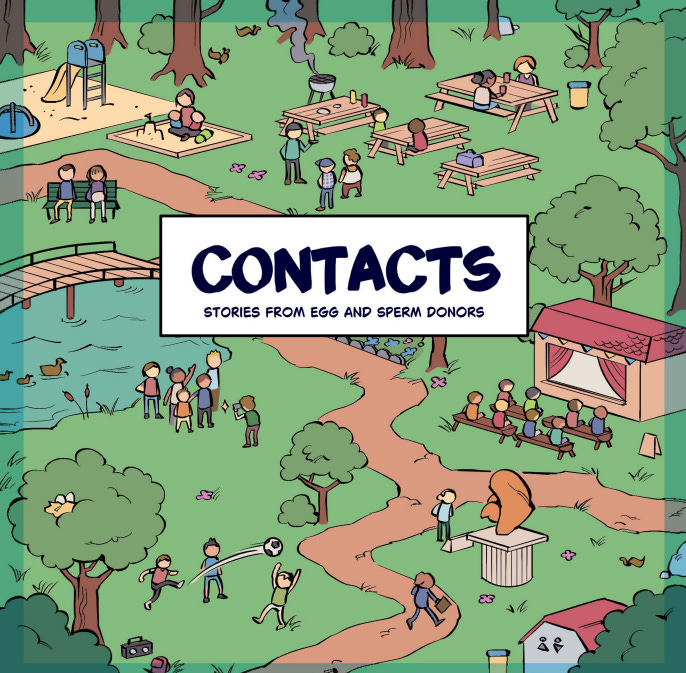Donation as a lifelong commitment rather than a one-time event
"A lifelong decision": a qualitative study of retrospective perceptions held by egg and sperm donors (Martin, 2025)
Martin, A., Côté, I., & Desjardins, S. (2025). "A lifelong decision": a qualitative study of retrospective perceptions held by egg and sperm donors. Reproductive BioMedicine Online. https://doi.org/10.1016/j.rbmo.2025.104986
Geographic Region: United States, Australia, and Canada
Research Question: How do egg and sperm donors feel about their donation experience when they look back on it years later, and do their feelings change over time as their lives change?
Design: A qualitative cross-sectional study using narrative life history interviews. Researchers conducted detailed, one-on-one video interviews with donors between February 2023 and March 2024, with each conversation lasting about 2 hours. Participants told their life stories related to donation. The analysis compared how donors felt at the time of donation versus how they feel now, focusing on how life experiences and changes in society influenced their evolving views.
Sample: 27 participants (15 sperm donors, 12 egg donors) from the United States (56%), Australia (30%), and Canada (15%). The donors were 38 to 80 years at the time of the interviews, and donations were made between 10-50 years prior. The average age at the first donation was 26 years old. All gamete donors had been contacted by donor offspring, and most were contacted through DNA testing (56%). 59% donated anonymously, 15% were ID-release donors, 11% were open or known donors. Donors were recruited for the study via social media, support groups, research networks, and snowball sampling.
Key Findings
Initially, many donors viewed their donation as a time-limited action that ended when they stopped providing samples, with limited understanding of long-term consequences.
Over time, donors' perceptions evolved significantly due to three key factors: personal life experiences (especially becoming parents), changing social contexts (DNA testing, policy shifts), and actual contact with donor offspring.
Donors developed a new understanding that their donations created human beings with needs and rights, particularly the right to access information about their origins. This led to recognition of long-term responsibilities and effects they hadn't initially considered. Most donors became supportive of donor-conceived people's rights, though two participants maintained opposition to contact.
Donors reflected on potential negative consequences they hadn't considered, including medical information they later discovered about themselves, difficulties experienced by donor offspring with their families, and impacts on their own relatives, including consanguinity risks.
Limitations: It was challenging to recruit donors, so researchers had to include many different types of donors, which limited their ability to make detailed comparisons. The study relied on people remembering events from decades ago, which may not always be completely accurate. Only two donors in the study had refused contact with donor-conceived people, so we don't know much about that experience.
Applications: Gamete banks, matching programs, and fertility clinics should reconsider how they counsel donors. Instead of presenting donation as a one-time event, they could explain it as a lifelong commitment. There’s also a need for ongoing support for donors, in particular when offspring begin to initiate contact.
Funding Source: Canada Research Chair in Third-Party Reproduction and Family Ties
Lead Author: Anaïs Martin is a social anthropologist and Postdoctoral Fellow at Université du Québec en Outaouais, Canada, specializing in third-party reproduction, kinship, and the experiences of various actors in donor conception. No personal connection to donor conception identified.
Regulatory Context: The study included donors from jurisdictions with varying regulatory approaches.
United States: Largely self-regulated fertility industry with no comprehensive federal laws governing gamete donation. No legal limits on donor compensation or requirements for anonymity prohibition.
Australia: State-by-state regulation with most states moving away from anonymous donation since early 2000s. Donor-conceived individuals generally have right to access identifying information at age 18.
Canada: Varies by province. Quebec adopted identity-release measures in 2022, while other provinces maintain different approaches to donor anonymity and information access.

Related Posts
Egg donors' evolving views on anonymity and contact (Holley, 2024)
Attachment style influences disclosure patterns in donor conception (Rodino, 2023)


As ID release donor this seemed so obvious to me, that this requires such a commitment. It's something to discuss when dating, to inform relatives about wanting to become donor. I pictured myself being old and living in an elderly place, when a donor conceived wanted to contact me. And I imagined to say yes to that. While I learned more and realized that requiring donor conceived to be at least 16 years (in the Netherlands) is a silly requirement. This moral obligation I said yes to remains the same.